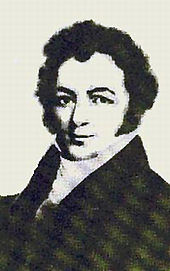Samuel Price Carson
Samuel Price Carson (born January 22, 1798 in Pleasant Gardens , McDowell County , North Carolina , † November 2, 1838 in Hot Springs , Arkansas ) was an American politician . Between 1825 and 1833 he represented the state of North Carolina in the US House of Representatives .
Career
Samuel Carson enjoyed a private education and then worked in agriculture. He also started a political career. Between 1822 and 1824 he was a member of the North Carolina Senate . In the 1820s he joined the movement around the future US President Andrew Jackson and became a member of the Democratic Party founded by this in 1828 . In the congressional elections of 1824 Carson was elected to the US House of Representatives in Washington, DC in the twelfth constituency of North Carolina , where he succeeded Robert B. Vance on March 4, 1825 , whom he fatally in a duel in 1827 injured. After three re-elections, he was able to complete four legislative terms in Congress by March 3, 1833 . Since Andrew Jackson took office as president in 1829, there has been heated debate in Congress over his policy. This included the controversial implementation of the Indian Removal Act , the nullification crisis with the state of South Carolina and the president's banking policy.
Carson lost to James Graham in 1832 . A year later he was re-elected to the North Carolina Senate. In 1835 he was a delegate at a meeting to revise the state constitution. Then he moved to Texas , where he helped draft the Declaration of Independence from Mexico and the Constitution of the Independent Republic . Between March and April 1836 he was the first foreign minister of the new sovereign state. In the same year he campaigned in the federal capital Washington for recognition of the Republic of Texas. He died in Arkansas on November 2, 1838.
Web links
- Ericson, Joe E. Carson, Samuel Price . In: Handbook of Texas Online
- Samuel Price Carson in the Biographical Directory of the United States Congress (English)
- Samuel Price Carson in the database of Find a Grave (English)
| personal data | |
|---|---|
| SURNAME | Carson, Samuel Price |
| BRIEF DESCRIPTION | American politician |
| DATE OF BIRTH | January 22, 1798 |
| PLACE OF BIRTH | Pleasant Gardens , McDowell County , North Carolina |
| DATE OF DEATH | November 2, 1838 |
| Place of death | Hot Springs , Arkansas |

